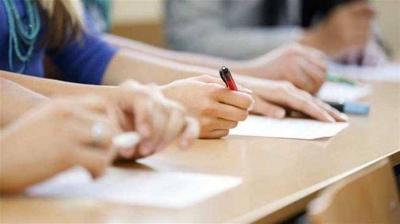About a month and a half away from the official high school exams, candidates are still awaiting a definitive decision regarding what has been termed as additional facilitation for students from border villages. This uncertainty continues as the Ministry of Education has decided on unified exams for all of Lebanon, tailored to the southern regions that have experienced the Israeli aggression and displacement throughout the academic year.
Currently, the approach to this issue is taking on security, service, and regional dimensions based on the efforts of educational offices, while the educational aspect of the students' realities, particularly in border towns, is neglected. The Educational Research and Development Center, which alone can substantiate this with figures based on a field study commissioned by Minister of Education Abbas Halabi, has not yet published its results.
The head of the center, Hayam Ishaq, confirmed to "Al-Akhbar" that the center will submit its report to the minister without disclosing any details. Meanwhile, it remains unclear by what criteria the exams for students from border villages will be conducted, what the "facilitations" (a vague term) will entail, and whether they will be exclusive to these students. The possibility of separate exam centers or different exam questions, which would undermine the concept of unified exams for which a battle has been waged, again leans towards the exceptional special arrangements. Generally, time is running short, and students are eager to see clarity to set up their study plans for the exams.
Following Halabi's assignment, member of the Development and Liberation bloc, MP Ashraf Baydoun, along with the central educational office leader in the Amal Movement, Ali Meshik, and some office members quickly contacted the educational center to redirect a study towards the 24 public and private high schools in border villages, whose students have been primarily affected by the ongoing war with Israel. Their schools had to close and shifted to remote learning, necessitating a precise evaluation and report to the Minister of Education.
Baydoun told "Al-Akhbar" that the center has completed its study and online meetings via Zoom have occurred between subject teachers from the closed high schools and subject coordinators at the educational center. He denied any move towards special provisions, asserting that students who learned remotely will have exceptional measures in place due to the inability to equate in-person with online education. He firmly stated that there would not be additional reductions for all students in Lebanon, but the center's recent efforts are focused solely on the affected high schools.
Does this not imply undermining the unified exams and conducting two different evaluations leading to two different certificates? Baydoun responded: "Not at all; that is out of the question. There will be unified standards and unified assessments at the same times, with special considerations within the unified exams," emphasizing that the ministry would not take a step back but rather will work on this minor aspect only to ensure fairness among examinees.
Regarding whether there is an intention to cancel the exams, as speculated recently under the assumption that no exams in the south means no exams for all of Lebanon, Baydoun replied that this talk is merely journalistic speculation. He stressed that conducting exams at the level of all Lebanon is a prominent face of educational resistance against Israeli aggressions.
However, these promises have not silenced the voices of students in the border villages, who have begun organizing in groups on social media. They have created a group and a channel on WhatsApp and posted videos on social media to follow their cause. This movement started with five students from the official educator Muhammad Faleh High School in Maiss El Jabal, and 855 students from public and private high schools have since joined. Their sources confirm that the exceptional circumstances have hindered their access to education and have prevented them from completing the curricula, while displacement conditions have obstructed their preparation for the exams.
Additionally, a significant number of them have not participated in education, be it in-person or online, and are now demanding certificates. Others affirm that their psychological and financial situations require them to be subjected to different exams that rely on an additional reduction of curricula and the introduction of multiple-choice questions, for instance.
In the second phase, students from the border villages will request a Zoom meeting with the Minister of Education in the presence of the media to explain all these concerns and intend to protest in the streets with their families if their demands are not met, according to "Al-Akhbar".




